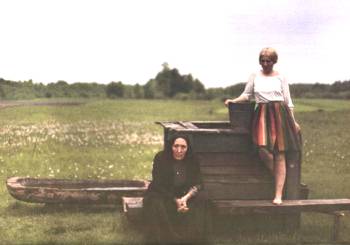 | ||||||||||
Brzezina [The Birch Wood]
 fot: Renata Pajchel |
I had long known the story by Jaroslaw Iwaszkiewicz but I had yet to gain a mature understanding of its message of selflessness. Polish Television cut short my growing pains by commissioning me to make The Birch Wood. Casting was over quickly and to my satisfaction.
We were in for a wonderful adventure. Each day new phenomena would occur in front of my eyes. First, quite inconspicuously, the birch trees got their first spring leaves, and on the very next day came the winter's last snow. A few days later, we rushed out at the break of dawn to shoot a scene among yellow marsh flowers which were not there the next morning when we came to finish the scene: they had withered and disappeared under water. Meanwhile, the nearby meadow had become all yellow with dandelions which, in a few days' time, turned into puffy white balls.
During the first few days, our crew, which was used to working in stuffy film studios, suffered a real shock caused by the crystalline purity of the early morning air. One day the set manager asked me for a cigarette, saying: "This fresh air is killing me..."
"Oxygen poisoning" became a joke among us. Intoxicated by this unusual drug, we were making a film like no other: fresh and surprising even to me. Inhaling deeply, I watched the film on screen feeling a strange lightness and amazement, as if it were not my own. A trace of that freshness has been captured both in the acting and in the camerawork.
The Birch Wood is violence, delicacy, passion, resignation, doubt, and lust for life, even in such an ill equipped world, woven together to defy the certainty of death. ... The Birch Wood is beautiful not only with the beauty of the forest landscape, but also, and above all, with an unheard of force of human gestures and emotions. A ray of sunlight is as important here as a final breath. This film, pulsating with the agony of parting gestures, is also pulsating with life.
Albert Cervoni
"France Nouvelle", Paris, 13 February, 1978
The fates of Wajda's heroes have always been tied to a more general fate of the nation, the community, the group, and determined by that general fate, usually ensuing in tragedy. The tragedy of his protagonists is usually based on the dissonance between individual dreams and aspirations, and collective, national experience, Here Wajda is observing a single human life in its purest form: tragic as it is, its tragedy is less dramatic for having been subjected to the laws of nature, life and passing away, which are laws that cannot be opposed. And the comforts of beauty and joy brought on by the stream of life make these laws all the easier to accept.
Jacek Fuksiewicz
"Film", Warsaw, 22 November, 1970
The sole weapon to fight the terror of death is love. And the only way to escape oblivion is by intensifying the instinctive search for sensual pleasure. (...) Sensuality rekindles the flame of life. Thus, in Freudian terms, we witness the struggle of Eros and Thanatos. The way Bertolucci presented the same duel in The Last Tango in Paris provoked scandal. Wajda has depicted the conflict with great visual clarity, showing idyllic nature, resounding with birds, and the shady nooks and crannies of a decomposing, degenerate world.
Jean Luc Douin
"Télérama", Paris, 8 February, 1978
This film is available at the Merlin bookstore
Oscar | Films | Theatre | Why Japan?
Favourites | Pictures gallery | About Wajda | Bibliography
Main Page | Search | Wersja polska
Copyright © 2000 Proszynski i S-ka SA. All rights reserved